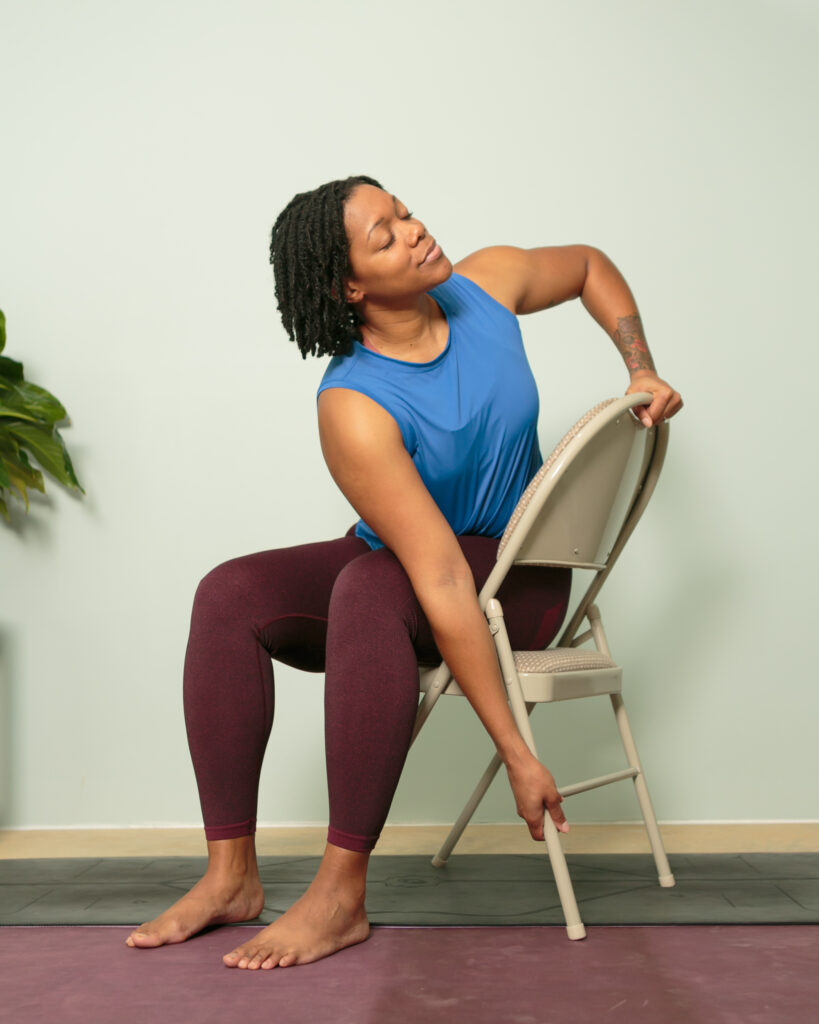You’ve heard the expression listen to your body but you have no idea where to start.
It seems like you’re constantly missing the signals and completely disconnected from the subtle whispers your body sends you every day. Listening to your body doesn’t happen overnight – it takes time, patience and daily practice to not only learn to listen but to heed the signals.

Let’s explore 4 ways that you can start listening to your body
4 ways to listen to your body
1. Practice mindful awareness
Simply put, mindful awareness means becoming aware of your body’s signals. The most common place to start is by noticing the different parts of your physical body and the ways your energy changes throughout the day. This is a practice of bringing your full attention to the present moment without judgment.
Try these practices:
Take a body scan – Find a comfortable position, sitting or lying down, and close your eyes or lower your gaze if that feels better. Mentally scan from the top of your head down to your toes, noticing any sensations or areas of tension. The goal here is simply to notice – not change, judge, assess or critique. Notice that you have toes and notice how they feel in this moment. Notice that you have a stomach and notice how it feels in this moment and so on. You can do this for as little or as long as you’d like.
I recommend taking a body scan between major events of your day like meetings, picking up the kids, getting home from work and making dinner, before bed, etc.
Check in regularly – Yes, you can listen to your body in as little as 5 minutes. Throughout the day, take a moment to pause and ask yourself how you’re feeling. Are you tired? Hungry? Stressed? Tune into your physical and emotional state.
Notice your energy patterns – Your ultradian rhythm is a natural biological cycle that repeats multiple times in a 24-hour period. These rhythms typically last between 90 minutes to several hours and include your bodily functions, alertness and rest periods and hormone cycles. Ultradian rhythms are different from circadian rhythms, which follow a 24-hour cycle.
Notice how you feel during certain times of the day and what was happening to cause that feeling. Some examples include feeling sleepy after breakfast, feeling energized for hours after your midday yoga class, feeling cranky after long meetings, etc.
2. Honor your body’s needs
Once you’ve strengthened the practice of listening, it’s time to honor your body’s signals by responding to them in a supportive way. Logically, this makes sense, but many of us have been conditioned to listen and then push past signals and override our instincts until we burn out.
Try these practices:
Rest before you’re tired – If you wait to rest when you’re tired, you’re a lot closer to burnout than you think. Instead of reaching for more coffee to push through the day, be proactive about taking regular breaks. During these breaks, change up the scene – move your body, stand and stretch and whenever possible, go outside.
Even a short nap can make a big difference in getting ahead of burnout.

Eat when you’re hungry – Yes, even if you just ate. Pay attention to your body’s natural hunger signals and respond with whole food meals at regular times each day. If you find that you’re always hungry, you may need to boost your meals with more fiber, complex carbohydrates and protein.
Keep your body in motion – Your body was made to move and you know what they say, a body in motion stays in motion. However, it’s important to move in ways that feel good and energizing to your unique body rather than as a punishment or something forced. Your body might be sending signals of stiffness, aches in hard to reach places and fatigue. Respond with a gentle yoga class, a nature walk or even dancing.
Breathe – Your breath is an anchor to keep you centered and it’s always there for you. If you’re feeling anxious or overwhelmed, pause and take a few deep breaths. Even 2-3 rounds of deep belly breathing can help you reconnect with your body and calm your nervous system.
3. Recognize emotional signals
Most of the conversation around listening to your body is about physical sensations. But, your emotions are closely connected to those physical sensations. When you’re angry, sad, or anxious, it often shows up in the form of tension, discomfort, or pain. Learning to recognize and process these emotional signals is an important part of listening to your body.
Try these practices:
Notice where your emotions show up physically – Do you feel tightness in your chest when you’re anxious? Do your ears ring when you’re sleep deprived? Does your jaw clench when you’re nervous? Observe how these different emotions manifest in your body and decide what you need in the moment to return to your balanced state.
Acknowledge your emotions – Your emotions are valid. You’re allowed to feel exactly how you feel and acknowledge your emotional states without judgment. Instead of suppressing your feelings, say to yourself, “I’m frustrated right now!” Naming it makes it real.
Practice self-compassion – After you’ve acknowledged and sat with your emotions, tend to yourself like you would a close friend. Treat yourself with kindness and understanding as you work through difficult emotions. Instead of criticizing yourself for feeling a certain way, try to approach your emotions with curiosity and compassion.
4. Trust your inner resource
You are the expert on you. Your body is fully equipped with its own inner guidance system, often referred to as intuition or gut feelings. Whatever you like to call it, it’s there to help you make decisions that are aligned with your true needs and desires…and it requires your complete trust.
Try these practices:
Tune into your gut feelings – Pay attention to the subtle sensations you experience when making decisions. Does your stomach feel tight or relaxed? Do you feel a sense of ease or tension in your chest? These physical sensations can be clues to what your gut is trying to tell you.
Start small, keep it simple – If you’re not used to trusting yourself, start with small decisions – what to eat for lunch, when to cancel plans, where to go on a walk. Over time, as you practice trusting your inner resource, you’ll become more confident in your ability to listen to your body as a whole.
Don’t overthink it – Maybe you’ve taken pride in your ability to overthink every situation. Overthinking can be a crutch to avoid taking action until you’ve determined that conditions are just right. When it comes to listening to your body, this isn’t the time to second-guess yourself. Try to quiet your mind and trust the signals your body is giving you, even if they don’t always make logical sense.
Listening to your body is not just about physical health; it’s about creating a deeper sense of connection with yourself. When you begin to trust and honor your body’s needs, you’ll find that you’re more in tune with your emotions, more aligned with your values, and more capable of making decisions that support your overall well-being.
—
You are the expert on you. Purchase my book to help strengthen your self-expertise – get your copy here!

